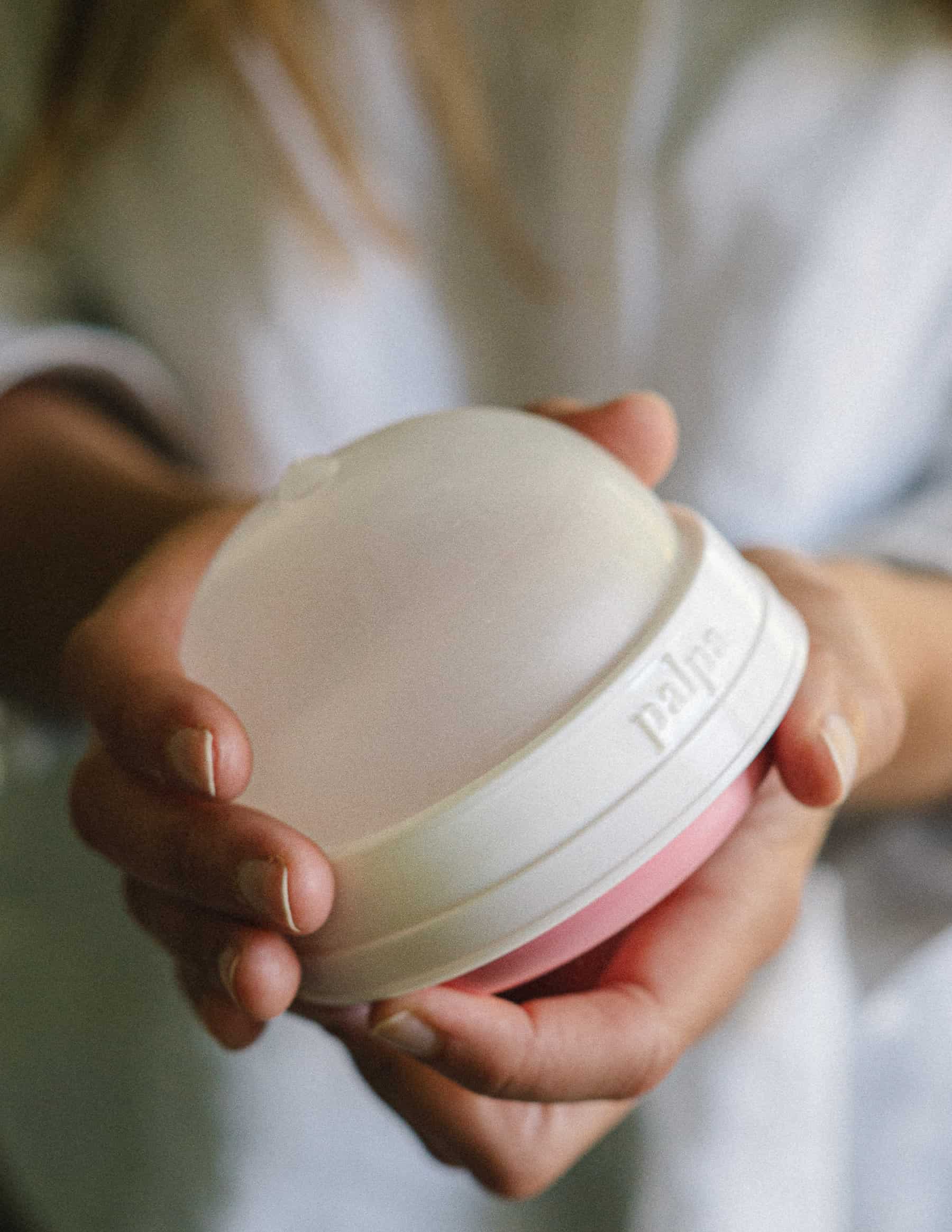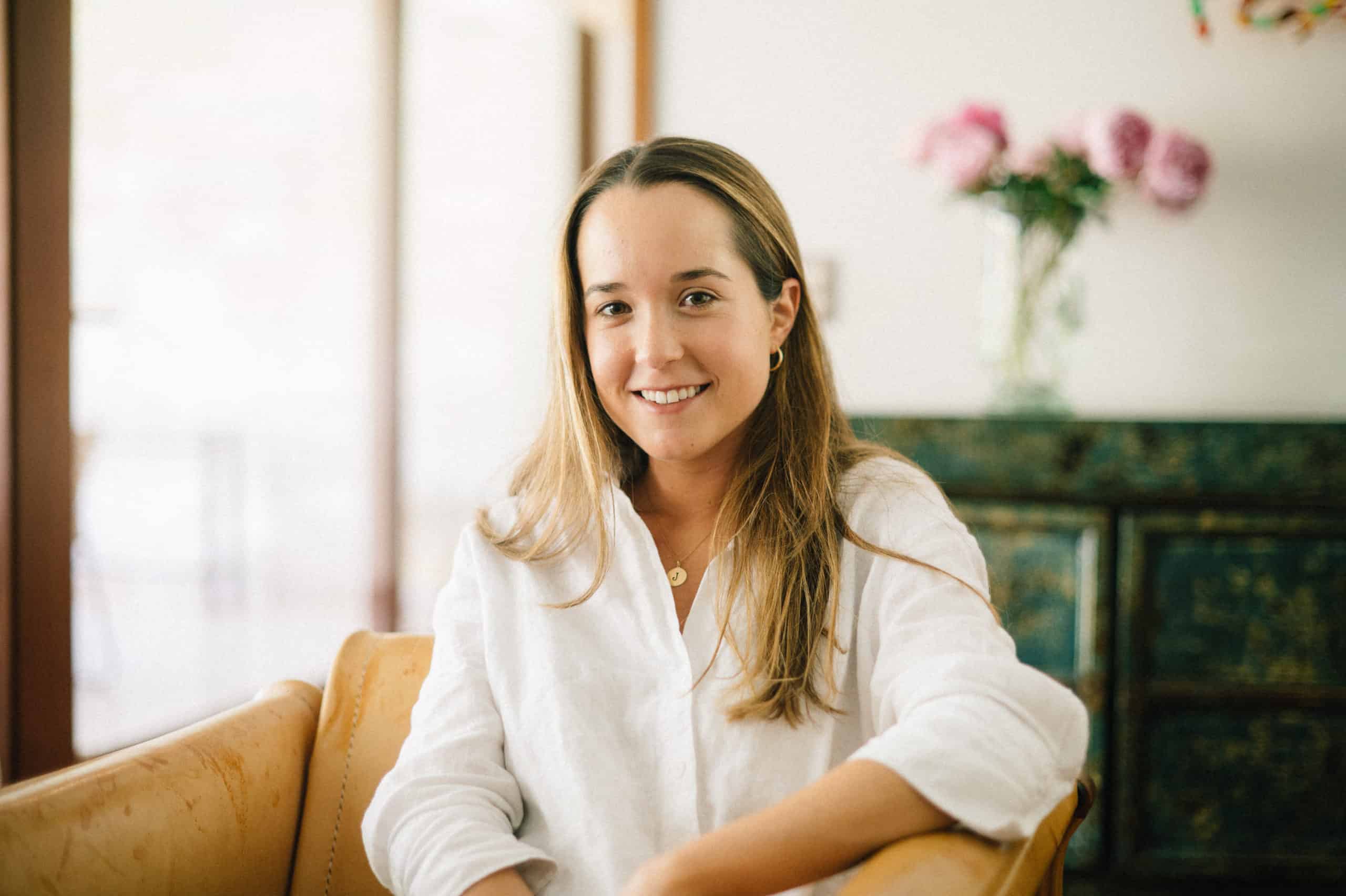
Por Isabel Plant
December 22, 2022
A few weeks ago, a man went to a public health center in Santiago, Chile. In the waiting room, a midwife was teaching how to use a peculiar device called Palpa: a container of liquid soap in the shape of a breast that includes an object that mimics a small tumor, designed to encourage cancer self-examination during the shower.
The device was being delivered through a partnership between a bank, a local municipality, and The Palpa Company, and the man came over to ask for one for his wife. At the touch of the fake tumor, he was startled, explaining to the midwife that he had something similar in his own chest. She was quickly asked for an examination and biopsy, finally adding to the cases in which this device has aided in detecting possible cancer cases.
The device is a creation of Chilean designer Josefa Cortés (26), recently highlighted among 35 young innovators in MIT Technology Review and who founded The Palpa Company in January 2020.
Through talks or interventions in municipalities or companies, her startup has instructed more than five thousand women in self-examination, vital for the early detection of the disease, especially in women under the age of 40. “The man’s case was incredible. There you realize the impact: he had touched something, but he didn’t have the information to do anything about it,” says Cortés.
A similar story led the Chilean woman to create her company.
Jovita Miranda, a woman very close to her family, suffered from untreated breast cancer. Miranda had felt a strange mass in her breast, thought it was normal, and left it alone.
Some time after, she was diagnosed with a tumor, already advanced. “Now she is fine, but she had to go through the whole process of breast cancer treatment, which is quite hard,” explains Cortés. Miranda now participates in several of Palpa’s campaigns.
Cortés elaborates: “I took breast cancer as a topic to investigate because there are many young women with breast cancer, and they are the ones who cannot have mammograms for different reasons, including that the breast is so dense that mammography is not as effective and the only tool is self-examination.”

Palpa, a soap dispenser. (Photo: Carlos Molina/Contxto)
It is estimated that about 16% of the cancers detected worldwide are breast cancer. At the Latin American level, it is the most diagnosed and the second cause of death by cancer in women. But if detected early, it is treatable: 9 out of 10 women could survive. As mammography is only recommended after the age of 40 (due to physical conditions caused by the incidence of age), self-examination is fundamental. Cortés saw a problem here—that three out of four women have never been screened for the disease—and devised a solution.
He surveyed surgeons and gynecologists to create an object to simulate a breast tumor. For someone inexperienced to use it, the fake tumor had to measure one centimeter, be as hard as a rock and not move when a finger was run over it. Without many international references, but taking medical breast phantoms as a background, the second step was to take the idea to an everyday product.
He went on to interview women, who said that a self-examination would be something they could do in bed or in the shower: “There you have access to the body in a natural way. In the shower, the woman was already interacting with the body, soaping up and exfoliating. I took that act to incorporate self-examination in the simplest and simplest way possible, so it ended up being a liquid soap dispenser.”
“There are a lot of related projects, and there’s a lot of technology being developed, but I wanted to create something that would fit in my head. I’m not good at software, so I started out so analog. That made me create something that didn’t exist, and that was patented. It was a household product and replicated a breast with a tumor”.
Palpa’s device quickly began to attract attention and applause, winning a contest at the Universidad Católica de Chile that allowed her to travel to the Startups Emerge Americas Fair in Miami. After this, Josefa Cortés, only 23 years old at the time, decided to start her own company.
Why did you come to set up a startup if you could have just launched a product in an online store?
“I always wanted to launch a product that would serve the market with a commercial angle, and Palpa has to reach as many women as possible. We need large samples to have large numbers where we help make self-examination a habit. I decided that this would not be a foundation but a startup. And yes, it is a startup because it is in the tech and femtech world, but I wanted this to be self-sustaining to reach more women in other countries. Making an e-commerce site when women didn’t know the product was a very slow way to grow because teaching users to use something completely new is very difficult”.

Josefa Cortés, CEO y fundadora de The Palpa Company. (Foto: Carlos Molina/Contxto)
Thus was born the business model that now has The Palpa Company as a self-financing company three years after its creation. They approached companies seeing that the device can work as a meaningful corporate gift. And they started doing a lot of online talks, which also help with massiveness.
“We can educate many women in a very short time. On average, there are 300 women in an online conference, so it’s unmatched versus the direct channel. That’s when Palpa started to grow, become profitable, and hire teams,” the founder explains.
The company made a family and friends round in August 2021 to be able to start production. “Nothing very corporate, more or less small amounts. We raised a round of 280 million pesos (Chilean pesos, about US$300,000). And now, we can proudly say that we are a profitable company and can continue to subsist thanks to the model of alliances with companies and talks. It is quite an achievement. There is a lot of confusion in the startup world today that the one that raises more capital is the one that does better. That’s not the case. It is a gigantic pressure to raise capital. The capital is not yours. You have to learn to use the resources most efficiently”.
Today they have also grown a lot in public-private alliances to be able to take the information and the device to more remote and disadvantaged schools and health centers.
The first sample of 200 devices was made in the middle of the pandemic, in 2020, with ports and imports closed. For this reason, Cortés and his team looked for national suppliers. The finished product was launched on the market in October 2021 and has been evolving based on consumer feedback; what started out as a more rudimentary and expensive design because it was made of silicone has now been transformed into one that is easier to use and fill. The next step is to be able to compete with regular products on the market to take the step to internationalization in 2023 in the USA, for which they will have to go through financing rounds in March or April.
Why direct to the U.S. without first stopping in Peru or Mexico, for example?
“For one simple reason: the problem is so well known worldwide that you don’t need to test that people adapt to your solution. Every person to whom you introduce Palpa understands the importance. In the U.S., because it is a more liberal culture, the breast device can be anywhere, in the supermarket or the pharmacy. The degree of novelty that the product has is so important that the main threat is delaying you in bringing it to market. That’s why Palpa grew so fast. If you don’t launch it that fast it may be something you’ve already seen.”
In the future, would you be interested in selling the company, or would you prefer to continue growing on your own?
“Until you’re on the case, it’s hard to answer with certainty. I have no interest in selling the company today. Because it has a lot of potentials to continue growing, cobranding with brands with foundations. Tomorrow I would like to dream that it will be delivered in India with the UN since it is the place where there is more breast cancer mortality. But if a transnational company comes and wants to distribute this worldwide, it will finally achieve Palpa’s mission, which is to reach as many women as possible. Not at the moment, but I don’t close myself, and I think that happens to many founders; perhaps one is not going to be good enough to reach the whole world as one would like”.
You also may be interested in: Latin American Femtech Companies Begin To Take Off